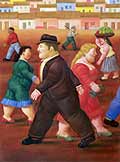| |
 |
 |
Quick Link to this page: www.unesco.org/shs/humanrights/larno
|
 |
 |
 |
 |
 |
|
 |
|
 |
| Latin American Research Network of Ombudspersons (LARNO) |
 |
| The Latin American Research Network of Ombudspersons (LARNO) is an initiative of the Andean and Central American Councils of Ombudspersons in close cooperation with UNESCO. |
 |
The principal aim of the network is to study and further develop economic, social and cultural rights (ESCR) in Latin America. The network should contribute to the establishment of a common platform for action to ensure that the public policies agenda promotes the implementation of economic, social and cultural rights.
The Central American countries participating in the network are: Costa Rica, Guatemala, Honduras, Nicaragua, Panama and El Salvador. The Andean countries participating in the network are: Bolivia, Colombia, Ecuador, Peru and Venezuela.
One of the tasks of UNESCO is to generate and disseminate knowledge on human rights by means of policy-oriented, multidisciplinary research. UNESCO has been organizing regional consultation meetings to determine the research priorities and to initiate the creation of regional research networks. The networks contribute to strengthening the regional cooperation in human rights research, catalysing regional processes for the protection and promotion of human rights.
In 2003, the Central-American Council of Ombudspersons and the Andean Council of Ombudspersons took the initiative, in close cooperation with UNESCO, to create the Latin American Research Network of Ombudspersons (LARNO). The main purpose of LARNO is to strengthen the capacity of Ombudspersons to promote an effective implementation of economic, social and cultural rights, starting with the right to education.
The competences of Ombudspersons and similar bodies in addition to their credibility and independence allow those institutions to play an active role in the promotion of human rights through the judicial, legislative and administrative systems. The collection of information and research findings will enable the Ombudspersons to identify the basic difficulties concerning the realization of economic, social and cultural rights, and the existing inequalities in policies governing the distribution of public goods. The research will analyse and develop comparative tools to measure the level of implementation of these rights.
At the national level, each Ombudsperson will design the best possible strategy to ensure that economic, social and cultural rights will be better implemented and will benefit the most vulnerable individuals and groups. The results collected are also important for the preparation of regional reports, such as the Andean report on human rights, which is presented by the Andean Community of Nations to the Heads of State.
At the international level, the countries participating in the network are willingly committed to respond to the UNESCO Strategy on Human Rights, adopted in October 2003 by UNESCO's General Conference. Latin American countries expressed their readiness to coordinate research efforts with UNESCO to advance all human rights for all. For this purpose, LARNO will create a common platform for action in order to influence public policy to increase the effective implementation of economic, social and cultural rights in Latin America.
© Painting by Fernando Botero. The Plaza. Colombia, 2001. |
 |
|
 |
 |
 Email this page Email this page  Printable version Printable version
Quick Link to this page: www.unesco.org/shs/humanrights/larno
|
 |
|
|


